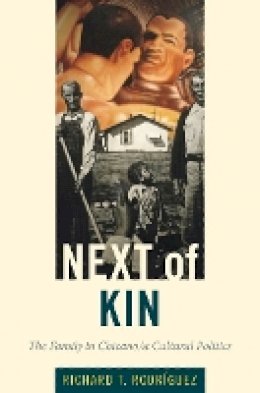Richard T. RodrÍguez is Associate Professor of English and Latina/Latino Studies at the University of Illinois, Urbana-Champaign.
“Overall, I thoroughly enjoyed Next of Kin and would recommend it highly. I plan to include it the next time I teach a gender and migration course. I think it would work well for upper-division undergraduate as well as graduate students.” - Leah Schmalzbauer, International Journal of Sociology of the Family “[T]he publication of RodrÍguez’s book is exceptionally timely given widespread prejudices many Chicanos–Chicanas are still facing. The book is engagingly written and will certainly be of great value for specialists in the Americas, queer and feminist theory, cultural studies, popular culture, kinship, and migration.” - Julia Pauli, American Anthropologist “The centrality of the family to Chicano culture is indisputable. One of Next of Kin’s merits lies in its push to expand the notion of exactly who makes up this family. The cultural studies approach, which allows for the analysis of various modes of cultural expression, explains the general absence of canonical literary texts, many of which prominently feature both biological and fictive representations of family. RodrÍguez counters this by critically engaging a rich variety of cultural practices, all of great relevance to the reconfiguration of la familia Chicana.” - JosÉ Pablo Villalobos, Camino Real “By studying the works of writers, filmmakers, painters, and musicians, RodrÍguez assembles a rich cultural study and illustrates how ‘alternative’ family configurations (as opposed to the husband-dominated model) have existed in Chicano culture longer than previously thought. . . .” - Charlie VÁzquez “Next of Kin offers one of the most cogent articulations of Chicana/o cultural critique to date. Through elegant readings of a dynamic archive of Chicano literary and popular culture, Richard T. RodrÍguez scrutinizes the cultural authority of the biological Chicana/o family, critiquing its exclusionary impulses and championing transformative reconfigurations of la familia. Along the way, he provides a nuanced consideration of Chicana/o political and cultural history.”-JosÉ Esteban MuÑoz, author of Disidentifications: Queers of Color and the Performance of Politics “A gorgeous tapestry of cultural forms and interpretive brilliance, Next of Kin reopens the debate over our conflicted understandings of la familia in light of the challenges produced by feminism and queer studies. A must read for all those interested in Chicana and Chicano politics, fiction, film, photography, performance, and painting. Richard T. RodrÍguez has given us a map with which to negotiate the twenty-first century uses of the family.”-George Mariscal, author of Brown-Eyed Children of the Sun: Lessons from the Chicano Movement, 1965-1975 “[T]he publication of RodrÍguez’s book is exceptionally timely given widespread prejudices many Chicanos–Chicanas are still facing. The book is engagingly written and will certainly be of great value for specialists in the Americas, queer and feminist theory, cultural studies, popular culture, kinship, and migration.” - Julia Pauli (American Anthropologist) “By studying the works of writers, filmmakers, painters, and musicians, RodrÍguez assembles a rich cultural study and illustrates how ‘alternative’ family configurations (as opposed to the husband-dominated model) have existed in Chicano culture longer than previously thought. . . .” - Charlie Vázquez “Overall, I thoroughly enjoyed Next of Kin and would recommend it highly. I plan to include it the next time I teach a gender and migration course. I think it would work well for upper-division undergraduate as well as graduate students.” - Leah Schmalzbauer (International Journal of Sociology of the Family) “The centrality of the family to Chicano culture is indisputable. One of Next of Kin’s merits lies in its push to expand the notion of exactly who makes up this family. The cultural studies approach, which allows for the analysis of various modes of cultural expression, explains the general absence of canonical literary texts, many of which prominently feature both biological and fictive representations of family. RodrÍguez counters this by critically engaging a rich variety of cultural practices, all of great relevance to the reconfiguration of la familia Chicana.” - José Pablo Villalobos (Camino Real)

